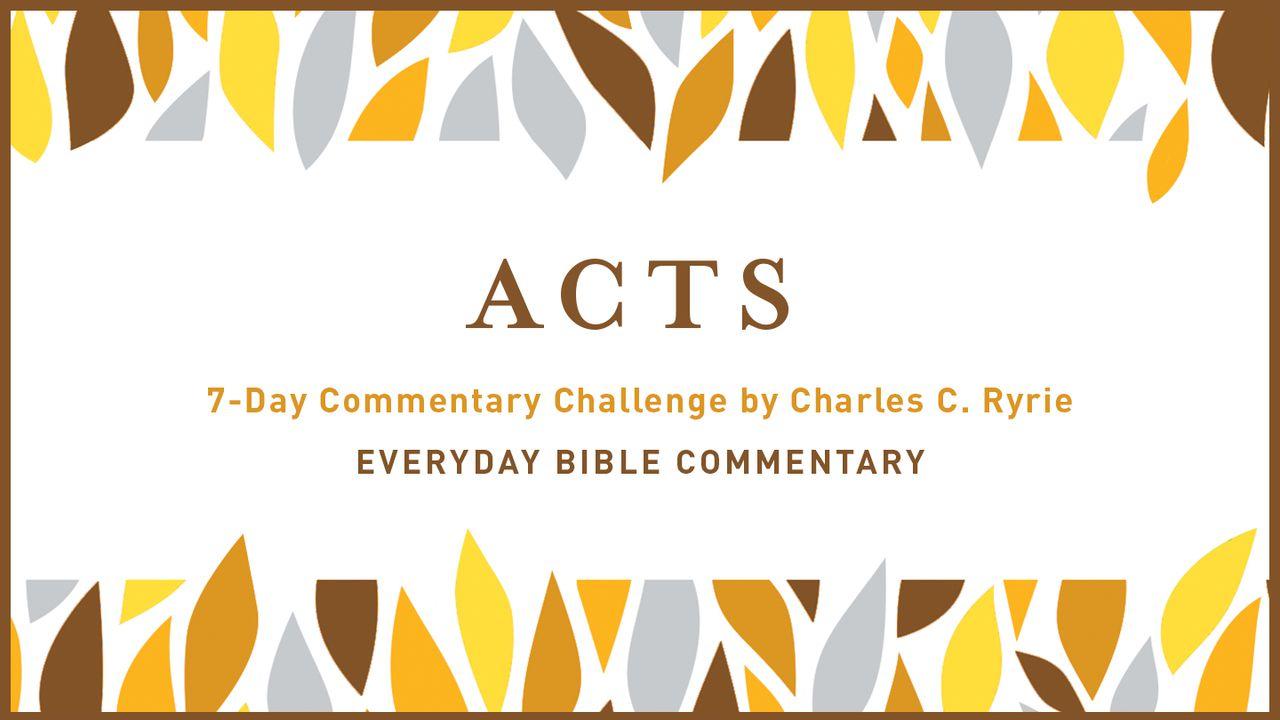7-Day Commentary Challenge - Acts 1-3 Sample

The Results, 2:37–47
1. A Conviction, 2:37. The word translated “pricked” is a rare one and means to pierce, sting sharply, stun, smite. Outside the Scriptures it is used of horses dinting the earth with their hoofs. The hearts of the people had been smitten sharply by the preaching of the Word. This brought the question, “What shall we do?”
2. A Change, 2:38–41. Peter’s answer was, “Repent, and each of you be baptized.” This demanded a twofold change: first a change of mind and second a change of association. Change of mind is the meaning of the word repent. This is not mere sorrow for sin, though that may be involved; nor is it a mere mental assent to facts. It is the kind of basic change of mind that will result in a change of life and is perhaps best conveyed by the phrase “change of heart” (cf. Rom. 2:5, where lack of repentance is described as an “unrepentant heart”). For these people, repentance meant a wholehearted change of mind about Jesus of Nazareth, thinking of Him no longer as merely the carpenter’s son, a religious imposter, but now receiving Him as Lord (Divine) and Messiah.
The second part of the change concerned their association as demonstrated by baptism. This was the visible proof of their repentance. It was not any sort of baptism (for baptism was well-known to these people both because of the ministry of John the Baptist and because it was one of the acts a Jewish proselyte had to undergo), but baptism in the name of Jesus Christ. Since baptism signifies association with the message, group, or person involved in authorizing it, baptism in the name of Jesus Christ meant for these people a severing of their ties with Judaism and an association with the messages of Jesus and His people. Baptism was the line of demarcation. Even today, for a Jew, it is not his profession of Christianity nor his attendance at Christian services, nor his acceptance of the New Testament, but his submission to water baptism that definitely and finally excludes him from the Jewish community and marks him off as a Christian. This explains the insistence on the ordinance. Verse 41 implies that the 3,000 converts were all baptized on the same day, and this would have been quite possible with the number of pools and reservoirs in Jerusalem and with all 120 disciples helping. This baptism was “for the forgiveness of your sins” (v. 38). This does not mean in order that sins might be remitted, for everywhere in the New Testament, sins are forgiven as a result of faith in Christ, not as a result of baptism. It means be baptized because of the remission of sins. The Greek preposition eis, for, has this meaning “because of ” not only here but also in such a passage as Matthew 12:41 where the meaning can only be “they repented because of (not in order to) the preaching of Jonah.” Repentance brought the remission of sins for this Pentecostal crowd, and because of the remission of sins, they were asked to be baptized.
3. A Church, 2:42–47. Although the word church first appears in Acts at 5:11 (the word is not in the best manuscripts of 2:47), the fellowship formed at Pentecost was the first Christian church. It was characterized by four things. (1) The teaching of the apostles. This would have consisted largely of the rehearsal of the facts and meaning of the life of Jesus. (2) Fellowship. This means the sharing of their spiritual blessings in Christ and the sharing of their material substance. (3) Breaking of bread refers to the remembrance of the Lord in the Lord’s Supper. (4) Prayers.
There were four results of this kind of fellowship. (1) Fear came upon every soul (v. 43). This is perfectly normal and healthy (I Peter 2:17). In this instance it was apparently encouraged by the miraculous signs that the apostles did. (2) Fellowship in material things was enjoyed by these early Christians (vv. 44–46). No doubt many of the pilgrims to the feast of Pentecost lingered in Jerusalem to learn more of their newfound faith in Christ, and this created pressing financial needs. After the incident recorded in chapter 5, there is no further mention of the use of this plan of sharing in common, for its necessity was undoubtedly short-lived.
(3) Favor was enjoyed by the new group with all the people (v. 47).
(4) Furtherance of the group was experienced as the Lord added daily such as were being saved (v. 47).
Pentecost is past. The church does not need another Pentecost. The Holy Spirit is here making available all His power. The need of the church is simply dedicated Christians who continue steadfastly in the apostles’ doctrine, fellowship, breaking of bread, and prayers.
Scripture
About this Plan

This commentary challenge is taken from the Everyday Bible Commentary on Acts 1-3, focusing on birth of the Church through the power of the Holy Spirit. This plan is for anyone who desires to deepen their study of Scripture and begin to discover the profound moving of the Spirit in the early Church.
More
Related plans

Noah: A Covenant With Humanity

Faith vs Fear

The Armor of God: Well Used Against Injury

Wherever You Are: Grace for Moms

Lent: The Journey of Letting Go

The Uniqueness of Jesus

Romans: God's Power to Save | Video Devotional

In Crisis but Not Consumed

Men of Encouragement
